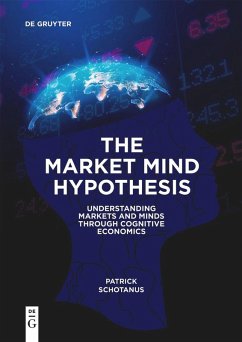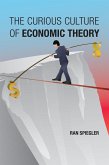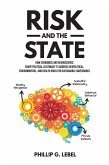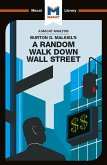In this pioneering book, Patrick Schotanus explains that economics' mechanical worldview is the ontological error which leads to flawed thinking and faulty practices. The Market Mind Hypothesis (MMH) thus calls it "mechanical economics": it not only erroneously views but also dangerously treats the economy as a machine, the market as an automaton, and its agents as robots. Inspired by heterodox economic and leading cognitive thinkers, this book offers an alternative paradigm. Central to MMH's psychophysical worldview is the fact that consumers, investors, and other participants are conscious beings and that their minds' extension makes consciousness a reality in markets, exemplified by market mood. Specifically, denial of the complex mind~matter exchanges as the essence of markets means the extended mind~body problem is economics' elephant in the room.
The book argues that if mechanical economics is the answer, we have been asking the wrong questions. Moreover, we will not solve our economic predicaments by doubling down on the assumption of rationality, nor by identifying yet another behavioural bias. Instead, scholars and students of economics and finance as well as finance practitioners need to investigate-through cognitive economics-the deep links between markets and minds to better understand both.
With a foreword by investment strategist Russell Napier, an intermezzo by neuroscientist and complexity pioneer Scott Kelso, and an afterword by 4E cognition philosopher Julian Kiverstein.
Dieser Download kann aus rechtlichen Gründen nur mit Rechnungsadresse in A, B, BG, CY, CZ, D, DK, EW, E, FIN, F, GR, HR, H, IRL, I, LT, L, LR, M, NL, PL, P, R, S, SLO, SK ausgeliefert werden.
Hinweis: Dieser Artikel kann nur an eine deutsche Lieferadresse ausgeliefert werden.
"This book is a fascinating analysis of an area ignored in traditional economics: the interaction between the market and how people collectively learn and change their mind." --Mervyn King, Former Governor Bank of England
"In this unique and compelling treatment, Patrick Schotanus weaves together theoretical economics and the science and philosophy of extended cognitive systems. Essential reading for anyone interested in markets - or minds!" --Andy Clark, Professor of Cognitive Philosophy, University of Sussex
"This is a visionary book that sets the scene for a paradigm shift ... from behavioural economics to cognitive economics ... This book offers a truly novel and compelling view of the Market - a view not only of how the Market works but a vision of how it could and should work in the future." --Karl Friston, Professor of Neuroscience, UCL
"In this book, Patrick provides a deep . . . philosophical dive into the interaction of economics, markets and the human mind ... I urge you to read this book, expand your understanding and let Patrick be your guide on a fascinating journey of discovery." --James Montier, Partner GMO
"The research agenda suggested by this book provides a perspective to ... a more cognitive-oriented economics ... It is highly recommended reading." --Gerd Gigerenzer, University of Potsdam
"[V]ery rarely, a book comes around to challenge established patterns and encourages the reader to look at markets, the broader economy and even one's own life through a new lens. This is such a book ... A must read!" --Louis-Vincent Gave, Partner and CEO Gavekal
"In this interesting and original book ... Patrick ... develops the idea that the market does have a mind, a personality, moods, that emerge collectively from its participants. And after all, what are markets, stock prices, interest rates, volatility, and default rates if not mental rather than physical phenomena?" --Emanuel Derman, Professor of Finance, Columbia University
"Patrick is an innovative and courageous thinker ... In this simultaneously well-researched and unorthodox book, he exposes the fault lines of classical decision-making theory and implores the profession to move beyond even behavioural economics and to consider how cognitive sciences can improve our understanding of economic decision-making." --Larry Hatheway, former Chief Economist UBS
"A must read and a fascinating new way of understanding how economies - and markets - work. If the last few decades have taught us anything, it is that we don't really understand them. This important book offers new thinking that might help us do better." --Merryn Somerset-Webb, Columnist Bloomberg
"This is a valuable new insight into the way markets behave." --Ian Harnett, Chief Strategist ASR
"Inspiring stuff." --Dylan Grice, Co-founder Calderwood Capital
"[R]ead this book, which introduces the Market Mind Hypothesis and sets out an ambitious research agenda." --Sir Geoff Mulgan, Professor UCL









